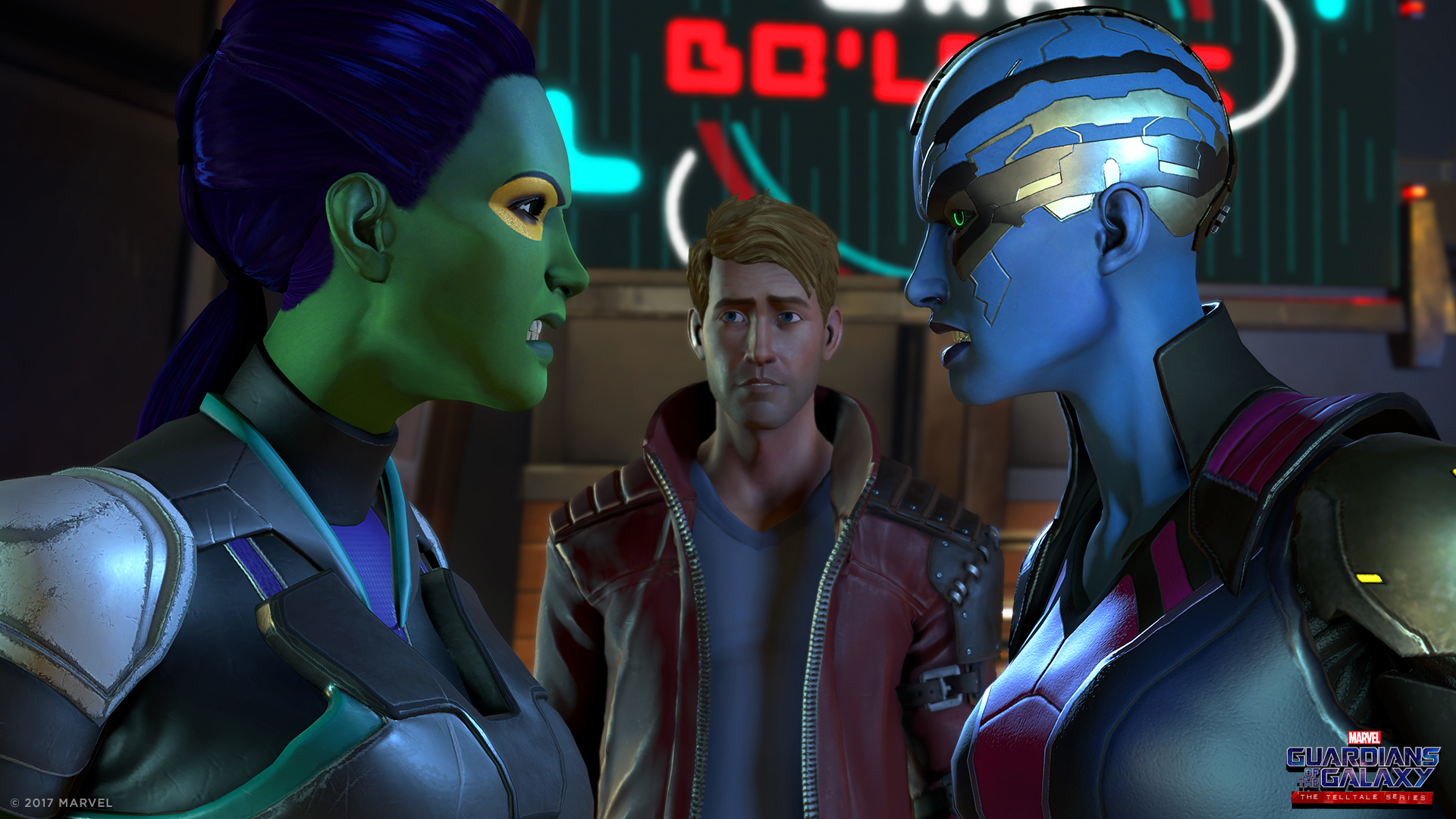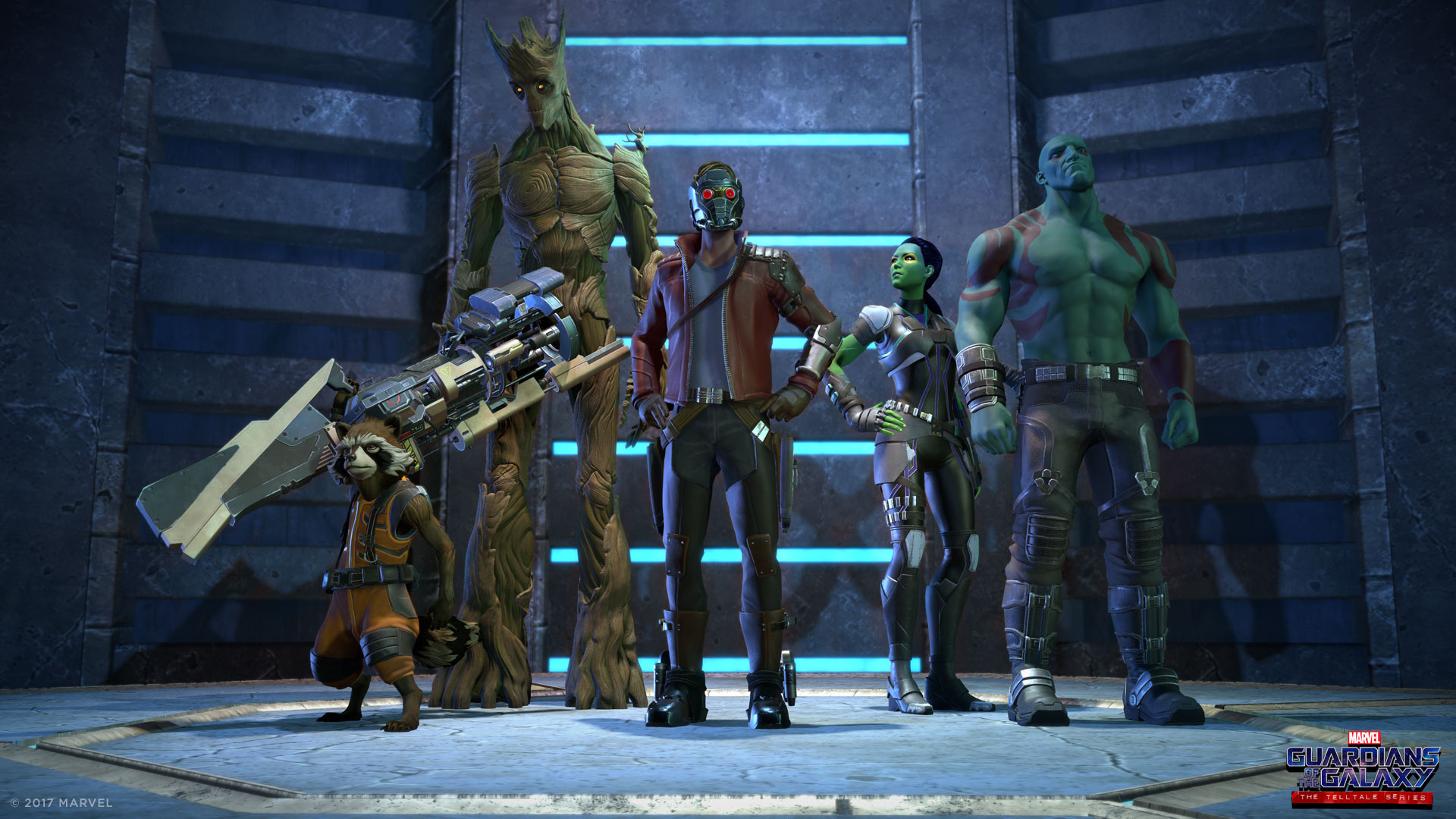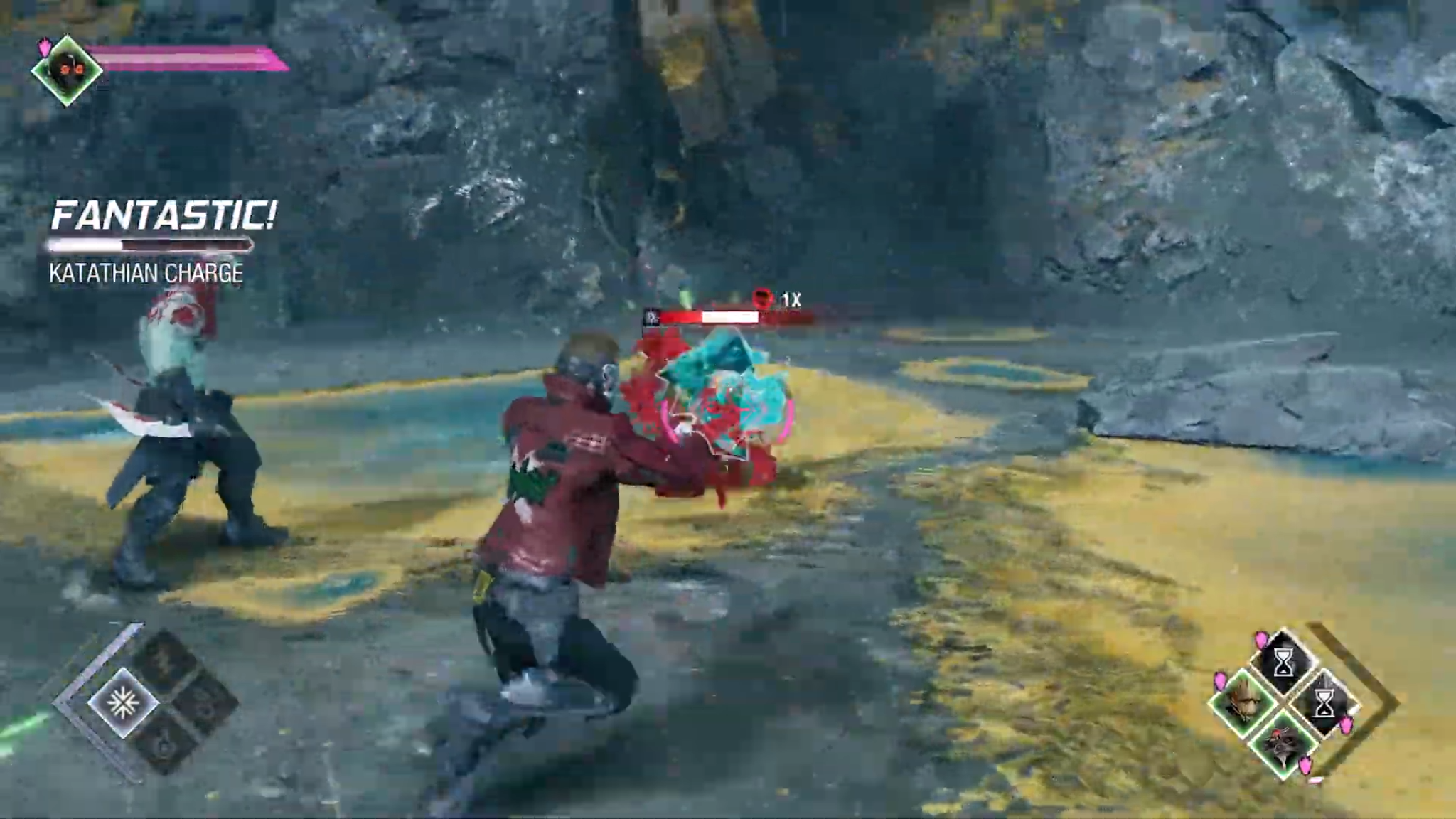Marvel’s Guardians of the Galaxy doesn’t look as good as Telltale’s
The best Guardians of the Galaxy game may already be available

Marvel’s Guardians of the Galaxy will be out in just a few short weeks, and at the risk of damning it with faint praise, it looks like a competent third-person action game. You’ll take control of spacefaring superhero Star-Lord and fight off a whole lot of faceless goons with the Guardians of the Galaxy at your back. It looks fine — but Guardians of the Galaxy games have the potential to be so much more than “fine.” I know this because we got such a game just a few years ago.
Before the company went under, adventure game developer Telltale produced tie-in titles for beloved series from Batman to Borderlands. While the company’s magnum opus was a heartfelt Walking Dead spinoff, back in 2017, it released five episodes of Guardians of the Galaxy: The Telltale Series. And, having finally finished the series, I can’t help but feel a bit apprehensive about the upcoming Eidos-Montréal adaptation. Guardians of the Galaxy absolutely can — and probably will — work as a standard third-person action game. But Telltale showed us that with a few smart risks, the property is capable of so much more.
Subverting expectations

First off, this whole piece needs a disclaimer that Marvel’s Guardians of the Galaxy is not out yet, and I could be completely wrong about it. I played about two hours of the game, and from what I can tell, those two hours are generally indicative of how the rest of the experience will go in terms of combat, puzzle-solving, dialogue and so forth. But some games radically subvert our expectations after a few hours, and if Marvel’s Guardians of the Galaxy is one of them, I’ll gladly eat my words.
Still, based on my time with the game, Marvel’s Guardians of the Galaxy is pretty standard action/adventure fare. You’ve got a protagonist who can shoot a lot of bad guys, upgrade his skills and gear over time and explore mostly linear levels, completing platforming challenges and solving mild puzzles along the way. He has a few non-player companions who help him out, both in and out of combat.
There’s nothing wrong with this formula. It’s worked for everything from Prince of Persia to God of War — but it’s also worked for a hundred other, less-memorable titles. What sets our favorite third-person action games apart from the rest of the pack are their innovative gameplay, heartfelt stories and inspired settings, and it’s not clear yet whether Marvel’s Guardians of the Galaxy has those things.
Besides, there’s nothing especially daring or unpredictable about making a third-person action game out of a superhero adventure franchise. It’s arguably the lowest-hanging fruit for the source material.
Compare and contrast to Telltale’s take on the titular team. While Telltale’s gameplay is admittedly nothing special (a dialogue-driven point-and-click adventure), it’s not afraid to pull the rug out from under the Guardians in the very first episode.
Beware that spoilers for Telltale’s Guardians of the Galaxy ensue below:
In the very first episode of Telltale’s Guardians of the Galaxy, the team takes down the Mad Titan Thanos. It’s not a fake-out or a misdirect; the very first thing the Guardians of the Galaxy do is destroy one of the Biggest Bads in the Marvel Universe. But without the franchise’s most recognizable villain hanging over their heads, the Guardians find themselves lost and aimless.
In other words, Telltale swapped “Can the Guardians defeat Thanos?” for the considerably more interesting, “Can the Guardians stay together without Thanos?”
From there, the series to turn traditional Guardians lore on its head. What if squabbling siblings Gamora and Nebula could actually make peace? You’re welcome to try — and you might succeed. Without a common threat to unite them, could the Guardians disband? Based on your choices, it’s a distinct possibility. Is it ethical for the good guys to control an object that has power over life and death? You’re allowed to say “yes” — and the story changes considerably if you do.
This won’t shock Telltale fans, but because you get to control where the story goes, the game can be surprisingly touching as well. Major character deaths hit especially hard, knowing that you might have made a different choice to prevent it. When your teammates rally to your side, it’s because you’ve built up a unique relationship with them — it’s not just a combat boost, as in the upcoming action game. One moment toward the end of the game just about broke my heart, but I could have chosen to bypass it entirely. (Either way, I’ll never hear Dancing in the Moonlight quite the same way again.)
Combat fatigue

In other words, because combat is not at the center of Telltale’s Guardians of the Galaxy, it has the ability to focus on the character drama that’s at the heart of the comics. But that’s not to say the game lacks combat — just that it uses combat sparingly.
Generally speaking, video games have a different cadence than movies or comic books. While movies and comics use occasional action scenes to heighten the stakes or bring plot points to a head, most video games are all action, all the time, punctuated by brief cutscenes or puzzles. Combat becomes background noise, and essentially loses all impact unless it’s against a particularly tough foe. As I mentioned in my Marvel’s Guardians of the Galaxy preview, I was essentially over the combat after two hours; I’m not sure I want to play a whole game with that as its backbone.
As an adventure game, Telltale’s Guardians of the Galaxy is more about choosing dialogue, making decisions, solving puzzles and simply immersing yourself in an interactive experience. Most of the five episodes have one big action scene toward the beginning and another one toward the end; otherwise, the pacing varies a lot, from quiet character moments to intense chase scenes.
The relative scarcity of combat also gives fighting a lot of weight. When Star-Lord, Gamora, Drax the Destroyer, Rocket Raccoon and Groot stand up to Thanos, Hala the Accuser or each other, there’s a real sense of danger and surprise. You don’t know who will live or die, or what else might get destroyed in the process.
Since combat in Telltale games is also based on quick-time button prompts, the developers were able to do some cool things with timing. When you square off against the final boss, Heart’s “Crazy On You” starts playing in the background. Every gunshot, sword stroke and narrow dodge syncs up with a pivotal moment in the song, making the battle considerably more stylish than the “shoot, dodge, wait for special attacks to recharge” rhythm from the upcoming action game.
In fact, in Marvel’s Guardians of the Galaxy, I gave my team a rousing pep talk as Twisted Sister’s “We’re Not Gonna Take It” started playing in the background — and then we were all gunned down by brutish enemies with nearly unbreakable shields. While Telltale’s combat is not exactly challenging, it did make for a much more memorable battle.
In any case, it’s difficult to judge a game I’ve played start-to-finish against one that I’ve played for only two hours. But the truth is, the Guardians of the Galaxy are not exactly my favorite Marvel franchise. (I was always more of an X-Men guy.) The constant pop culture references can be grating, and most of the characters are selfish and short-sighted, even by Marvel superhero standards. Even so, Telltale’s Guardians of the Galaxy made me feel completely invested in the team and their story. Marvel’s Guardians of the Galaxy reminded me why I usually stick to Marvel’s other teams.
In the meantime, the bad news is that if you want to play Telltale’s Guardians of the Galaxy, it’s nearly impossible to do so. Telltale has been defunct since 2018, and licensing issues prevent digital retailers from selling Guardians of the Galaxy. The game had a limited physical release, and even that doesn’t always play nicely with Sony and Microsoft’s download servers.
As such, Marvel’s Guardians of the Galaxy already has one huge advantage over Telltale’s adaptation: When it comes out, it will be extremely easy to buy.
Sign up to get the BEST of Tom's Guide direct to your inbox.
Get instant access to breaking news, the hottest reviews, great deals and helpful tips.
Marshall Honorof is a senior editor for Tom's Guide, overseeing the site's coverage of gaming hardware and software. He comes from a science writing background, having studied paleomammalogy, biological anthropology, and the history of science and technology. After hours, you can find him practicing taekwondo or doing deep dives on classic sci-fi.

